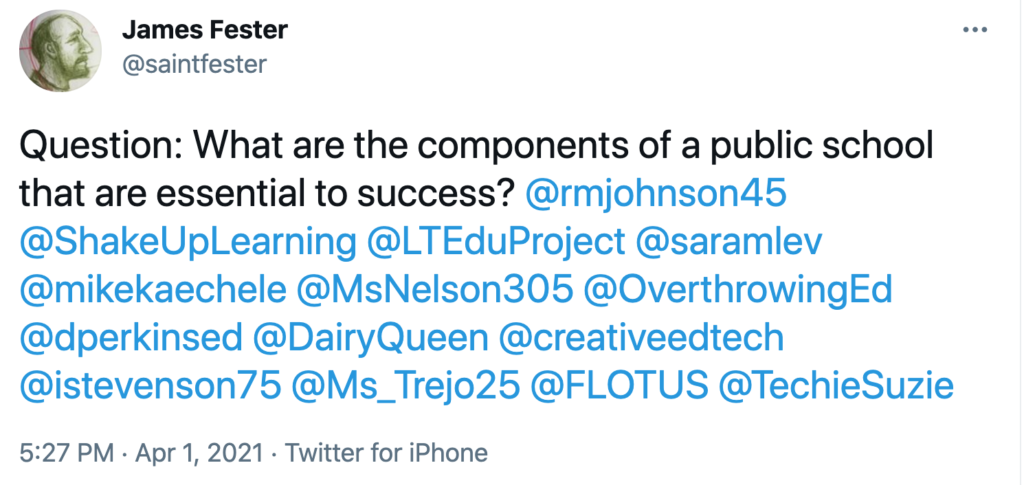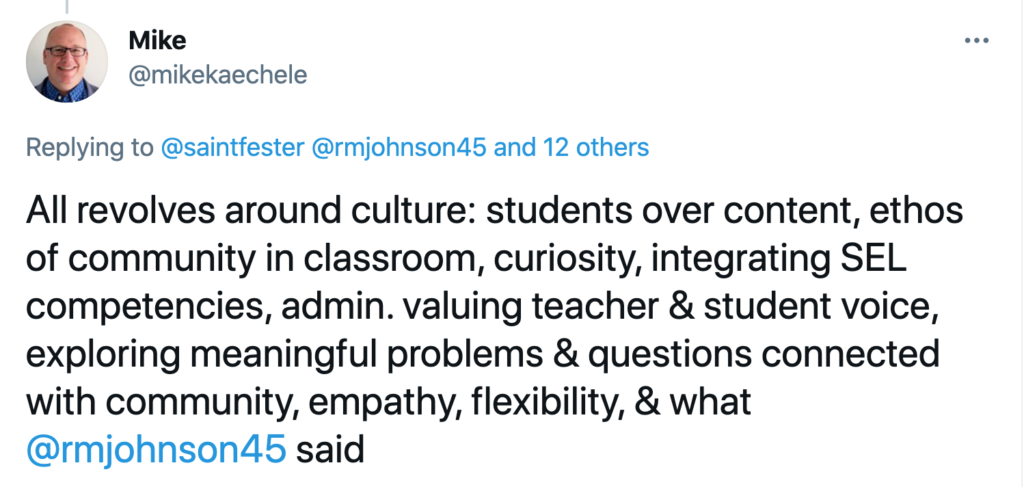
My friend James threw out this question in a tweet this week and received many intriguing responses. As I personally know many of the people who responded (not @FLOTUS obviously and am curious why @DairyQueen was included), I could see their personalities and passions reflected in their answers. I added a list of my own thoughts, but Twitter is never the place to flesh out complex ideas.

What I really wanted to say was just culture, that’s it. And if you have ever read my blog before, you know that I am passionate about integrating Social and Emotional Learning into Project Based Learning. But those are actually pedagogical frameworks to structure the ideal culture. And without the proper culture they fall flat and are ineffective.
Of course, there are many aspects of education that are complicated, nuanced, and attached to huge systems. But oftentimes what most holds educators back is a culture of fear of rejection based on the traditional perspective of how schools should function. If you have ever visited a school or class that was truly mind blowing in what students were doing, I can guarantee it had a strong culture that allowed it to deal with many of the systems and adversities that hold other schools back.
Every school has a culture, but what are the key ingredients of successful culture that should be adopted by all schools? One of the first things that young children learn are their ABC’s, as a basis for reading. Here are my ABC’s that are the foundation of a powerful school culture.
- Action
- Bravery
- Curiosity
- Caring
Culture of Caring
I know it starts with “C,”but we have to begin with caring. Kids first. Not the needs of adults in the system: control and compliance that squash individualism. Not the needs of the state: high standardized test scores that reject creativity. Not the needs of business: the economy above all else while neglecting inequities. Not the needs of curriculum: covering all of standards while boring students to death. All schools say that they care for children, but actions and school policies speak volumes.
Evidence of Caring? When it is obvious that students and adults in the building enjoy working together.
Successful schools value community and relationships above all else. Students are the customers that school is designed for, not passive objects that school is done to. Adults value empathy, not only as something to be taught to students, but modeled by involving students in all decision-making processes.
In caring schools, students and adults watch out for each other. They check in on mental health. They laugh at inside jokes. They geek out about passions and create class rituals. Social and Emotional Learning is not an add-on activity, but is integrated into the day with kids developing the competencies through authentic work. Caring is the bedrock that the rest of school culture is built upon.
Culture of Action
I am a firm believer that whoever is doing, is learning. Listening to a lecture and taking notes is NOT doing. Active learning means kids are moving, creating, experimenting, going outside, brainstorming, observing, speaking, collaborating, solving problems, asking their own questions, exploring, and making. SEL skills aren’t just being discussed, but actively practiced in their project teams.
Action means noise, not silence. Classroom management means the teacher is facilitating multiple groups doing different tasks, not watching quiet rows of compliant kids. Students aren’t “locked” in the classroom but spill into the hallways and outdoors. The room doesn’t look like a Pinterest picture, but shows evidence of student learning artifacts scattered throughout. Students are engaged in their work not bored by stale textbooks. They are creating meaningful products that reflect their learning, not cramming facts for tests.
Culture of Bravery
The overarching culture of traditional schools is control and compliance. Administrators demand it from teachers, who in turn require it from students. Great schools flip this model on it’s head and practice freedom. A culture of bravery means that districts reject everything that is not aligned to holistic student growth and learning. District level administration bravely rejects cultural and political pressure for high test scores, accountability measures, and standardization. They empower principals and teachers as professionals to design learning experiences based on students, not curriculum.
There is no fear of failure, only joy in pursuing passions.
Building principals bravely trust their teachers and support innovations that are student-focused. Flexibility is valued. Traditions are cherished when they build community, but rejected when they are only about controlling young people. Adults place student voice over compliance. Administrators are in the habit of saying “yes” to teachers and students who want to experiment and try something out of the box.
A culture of yes, also means saying “no” to harmful practices that value systems and adults over children. It means either skipping standardized tests or de-emphasizing them to the point of ignoring them; getting rid of punitive punishments and replacing them with restorative practices; and searching out and eliminating inequitable practices that harm our most vulnerable students. Based on the culture of caring, anything that gets in the way of student-centered learning is bravely eliminated.
Before every new initiative, students should be asked for input and it should be valued as the most important viewpoint. Not the placement of a token student on the school board, but actually listening to what kids think, say, and want for their education. Schools that move beyond limited choices for students to truly empowered student voice in changing their communities.
Culture of Curiosity
With the removal of so many systemic constraints, students are encouraged to pursue their passions. They ask meaningful questions about their community, engage in authentic inquiry, and seek out practical solutions. They are not preparing for the future, but contributing right now! Project Based Learning is the philosophical framework that structures and guides student curiosity around issues seeded in their community and the world.
Teachers aren’t seen primarily as content experts (although they are) but designers of master learning experiences guiding students down paths that they might not discover by themselves. Teachers are learning experts who model questioning, experimenting, and failure for students. Through PBL, students practice Transformative SEL skills as they address complex problems of the world to bring about justice. Curiosity leads to empathy of multiple viewpoints rather than one dogmatic approach. Students develop into self-directed learners who have the tools to investigate and propose solutions to any problem that they come across. They become curious leaders who never stop learning.
Questions? Interested in an SEL infused PBL workshop or consulting? Connect with me at michaelkaechele.com or @mikekaechele on Twitter.
